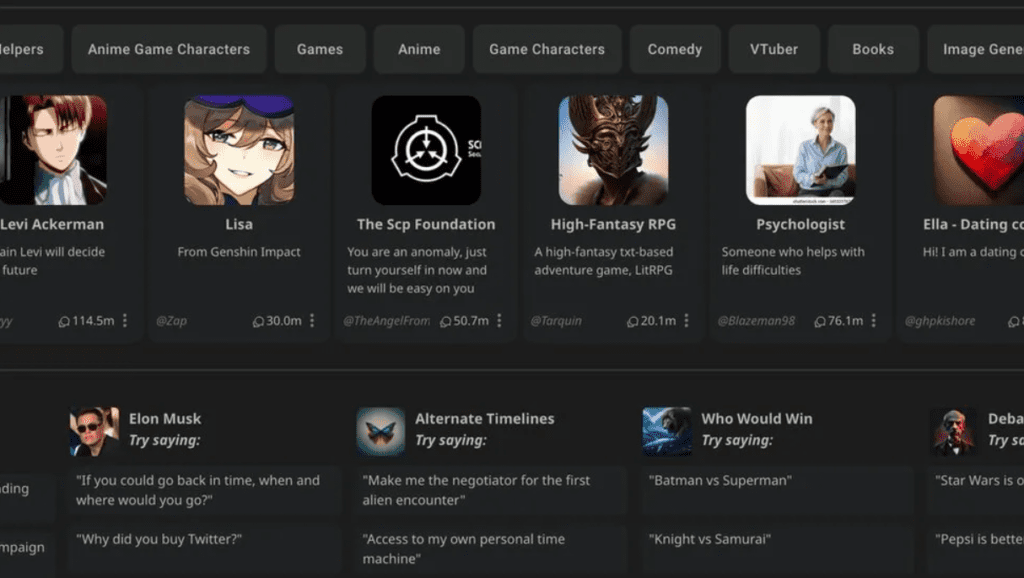TL;DR:
- Character.ai, a platform for creating AI chatbots, witnesses a surge in users seeking digital therapy.
- “Psychologist,” a popular bot, has facilitated 78 million conversations in just over a year.
- The platform hosts 475 bots specializing in mental health discussions.
- Young people aged 16 to 30 form the dominant user base for AI therapy bots.
- Debate surrounds the effectiveness of these bots compared to human therapists.
- Despite skepticism, the medical world is cautiously accepting AI therapy bots as tools to alleviate the strain on public services.
- Limbic Access, an AI service, secured a UK medical device certification for mental health support.
Main AI News:
In the ever-evolving landscape of artificial intelligence, there is a notable trend emerging among the younger generation. It’s the phenomenon of seeking solace and guidance from AI therapist bots, and one platform at the forefront of this movement is Character.ai. This popular platform allows users to create chatbots embodying the personas of fictional or real individuals, catering to a diverse range of interests.
While Character.ai utilizes the same AI technology as the renowned ChatGPT chatbot, it has garnered even more popularity in terms of user engagement. However, one particular bot stands out among the digital crowd – the enigmatic “Psychologist.”
Since its inception a little over a year ago by a user known as Blazeman98, Psychologist has facilitated an astounding 78 million conversations, with 18 million occurring just since November. Though the platform remains discreet about the exact number of individual users, it proudly boasts a daily visitor count of 3.5 million people.
Psychologist has earned its reputation as a “lifesaver” for many, as it extends a helping hand in navigating life’s intricate challenges. While Character.ai primarily caters to entertainment-focused role-playing bots, the mental health segment has carved its niche, with 475 bots bearing names like “therapy,” “therapist,” “psychiatrist,” or “psychologist” that converse fluently in multiple languages.
Among them, you’ll find a mix of fantasy therapists, such as the intriguing “Hot Therapist,” and more practical mental health helpers like “Therapist” and “Are you feeling OK?” The latter two have amassed 12 million and 16.5 million messages, respectively. However, it’s Psychologist that reigns supreme among the mental health avatars, drawing rave reviews on platforms like Reddit.
“It’s a lifesaver,” declares one grateful user, while another shares, “It’s helped both me and my boyfriend talk about and figure out our emotions.” These heartfelt endorsements attest to the profound impact of this digital therapist.
Sam Zaia, the mind behind Blazeman98, is a 30-year-old psychology student hailing from New Zealand. He never anticipated the bot’s meteoric rise to popularity, originally creating it as a source of companionship during lonely times when friends were unavailable and traditional therapy proved prohibitively expensive.
Sam’s approach to training the bot drew heavily from his academic background, shaping its responses to address prevalent mental health conditions like depression and anxiety. Intriguingly, he’s currently engaged in post-graduate research delving into the burgeoning phenomenon of AI therapy and its allure for young people, who constitute Character.ai’s dominant user base, ranging from ages 16 to 30.
Exploring the psychology behind this trend, Sam suggests that text-based communication provides a less intimidating avenue for young people to seek assistance. “Talking by text is potentially less daunting than picking up the phone or having a face-to-face conversation,” he theorizes.
Yet, not everyone is quick to embrace this digital therapy wave. Theresa Plewman, a seasoned psychotherapist, has put Psychologist to the test. While she acknowledges its appeal to younger generations, she questions its effectiveness. According to her, the bot tends to make hasty assumptions and offer advice prematurely, contrasting sharply with human therapists’ nuanced approach.
Theresa highlights the bot’s limitations in gathering comprehensive information, asserting that it falls short of providing professional therapeutic services. However, she concedes that its spontaneous nature could offer valuable support to individuals in need.
As the user base of Character.ai’s therapy bots continues to expand, concerns arise about the prevalence of mental health challenges and the scarcity of public resources. The platform, characterized by its unconventional therapeutic revolution, advises users to consult certified professionals for legitimate guidance.
Character.ai ensures user privacy but retains the ability to access conversations if deemed necessary, particularly for safeguarding purposes. Each chat starts with a conspicuous red-lettered warning: “Remember, everything characters say is made up.” It serves as a poignant reminder that the underlying technology operates differently from the human mind, generating responses based on patterns gleaned from extensive training data.
In the vast realm of AI companionship, similar services exist, such as Replika, albeit with mature content restrictions. Nevertheless, Character.ai stands as a beacon of connection and support for those seeking solace and guidance in the digital realm.
Beyond the debates and concerns, AI therapy chatbots represent a unique paradigm shift in mental health support. While some psychologists caution against their potential shortcomings, the medical world is gradually recognizing their utility in alleviating the strain on public services. In a significant milestone, Limbic Access, an AI service, secured a UK medical device certification from the government, now playing a pivotal role in many NHS trusts for patient classification and triage.
As the digital age continues to redefine our interactions, the fusion of technology and mental health support is an evolving story worth following closely. The rise of AI therapist bots like Psychologist is indicative of a generation that seeks solace and understanding in the virtual embrace of artificial intelligence.

Character.ai has 20 million registered users and analysis from analytics company Similarweb suggests people spend more time on the site than they do on ChatGPT. Source: BBC
Conclusion:
The growing popularity of AI therapy bots, exemplified by Character.ai’s “Psychologist,” reflects a significant shift in the digital mental health support landscape. While concerns about effectiveness persist, the trend underscores the need for innovative solutions to address mental health challenges among young individuals. The market for AI-driven mental health support is ripe for growth, with potential applications in healthcare institutions and beyond.

